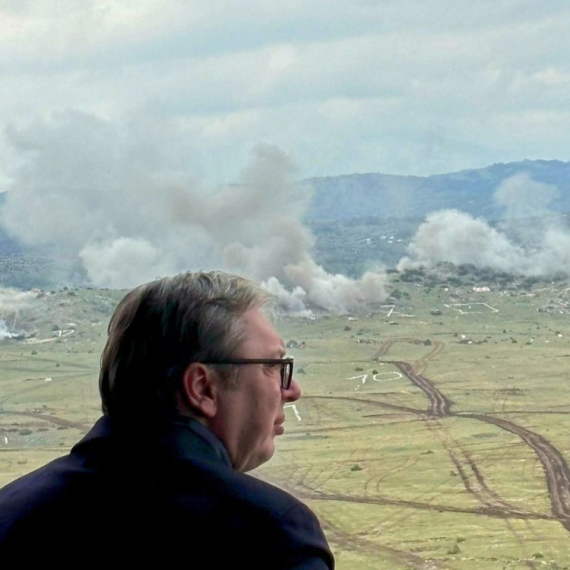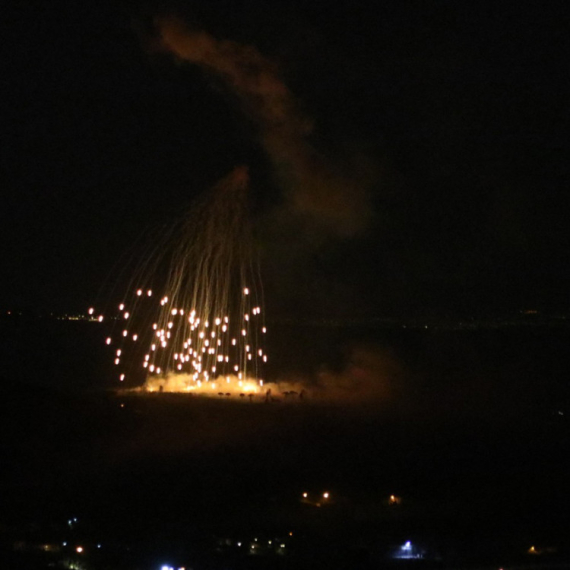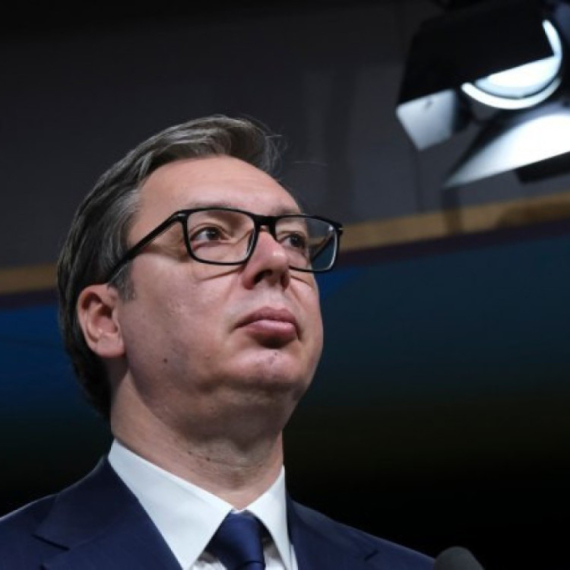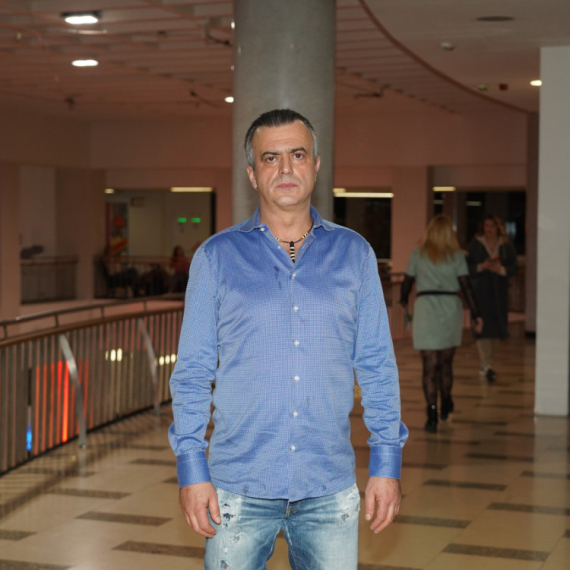"Albanian side insisted on U.S. involvement"
"If you want America in the finish, it must be involved in the negotiations from the very beginning", Daniel Serwer says, according to Belgrade daily Politika.
Friday, 01.10.2010.
19:28

"If you want America in the finish, it must be involved in the negotiations from the very beginning", Daniel Serwer says, according to Belgrade daily Politika. The U.S., along with the European Union, will be involved from the very start in the coming negotiations between Belgrade and Pristina on practical issues and that was, as far as Washington is concerned, a decision that was in a certain way forced by insistence of the Albanian side which had its own, easily conceivable reasons. "Albanian side insisted on U.S. involvement" This is the standpoint of Daniel Serwer, vice president of the U.S. Institute of Peace, a national institution funded by the Congress, mission of which is prevention and resolution of international conflicts. Officially, the visit of Hillary Clinton to the region, or should we say Belgrade, and, as she personally stated yesterday at a joint press conference with Chief of the EU diplomacy Catherine Ashton - Pristina – has not been announced yet, and the Department of State remained silent to the questions we had today regarding the agenda of the upcoming talks. American diplomacy is a huge and complex mechanism, with slow moving wheels, but once they are set in motion they produce a predictable outcome. Following yesterday’s meeting between Clinton and Ashton, it has become obvious that the USA will take an active role in the dialogue between Serbs and Albanians because, Daniel Serwer explained, "if you want America in the finish, it must be involved in the process from the very beginning". According to his opinion, the EU wanted to untangle the Serbo-Albanian knot on their own, Washington may have wanted to “wash their hands of it”, but that, from the standpoint of politics and interests the involved parties had, was simply not possible – nor would it be, says the expert, good from the viewpoints of Belgrade and Pristina. The main reason why America might want to turn this over to the Europeans is the very tight agenda of the local diplomacy. One could see how the agenda looked like from yesterday's talks State Secretary Clinton had not only with Catherine Ashton, but also German Minister of Foreign Affairs Guido Westerwelle. In a relatively short time span, several very important processes should be initiated, maintained and finished. The list contains, among other things, a new strategic concept of the NATO, the adoption of which is scheduled for the summit that is going to be held on November 19 - 20. In addition, high on the priority list is Middle East peace process between Israelis and Palestinians, where Obama's diplomacy wants to achieve a tangible result. Then there is Afghanistan, where in less then a year, in increasingly difficult circumstances, the conditions should made for gradual withdrawal of some 150,000 US and coalition troops in July 2011. And finally – and not necessarily in the order listed – the USA and its European partners are seeking to renew a diplomatic process outcome of which would be restraining Iran's nuclear ambitions. The Kosovo problem in that context becomes quite relative, even though relevant, the fact convincingly demonstrated by Hillary Clinton's personal involvement and the upcoming visit to Belgrade and Pristina, which, according to unofficial information, should commence on October 12. Daniel Serwer believes that the start of the dialogue between Belgrade and Pristina on practical issues, which are numerous, would bring about a new political fact: that the Serbian side will accept the legitimacy of Pristina authorities as a fact. However, he warns that the toughest decision – one in which Serbia is to recognize sovereignty and integrity of Kosovo - will inevitably find its way to the agenda. That will have to happen prior to Serbia's ascension to the EU, for which, in his opinion, "Serbia is technically well-equipped, so there is a chance to make up for the lost time, but first some tough political decisions need to be made". In practical negotiations, a mitigating circumstance according to Serwer is the fact that some negotiators know each other very well, as they participated in many of the agreements immediately after the war, mediated by the US Institute of Peace.
"Albanian side insisted on U.S. involvement"
This is the standpoint of Daniel Serwer, vice president of the U.S. Institute of Peace, a national institution funded by the Congress, mission of which is prevention and resolution of international conflicts.Officially, the visit of Hillary Clinton to the region, or should we say Belgrade, and, as she personally stated yesterday at a joint press conference with Chief of the EU diplomacy Catherine Ashton - Priština – has not been announced yet, and the Department of State remained silent to the questions we had today regarding the agenda of the upcoming talks.
American diplomacy is a huge and complex mechanism, with slow moving wheels, but once they are set in motion they produce a predictable outcome. Following yesterday’s meeting between Clinton and Ashton, it has become obvious that the USA will take an active role in the dialogue between Serbs and Albanians because, Daniel Serwer explained, "if you want America in the finish, it must be involved in the process from the very beginning".
According to his opinion, the EU wanted to untangle the Serbo-Albanian knot on their own, Washington may have wanted to “wash their hands of it”, but that, from the standpoint of politics and interests the involved parties had, was simply not possible – nor would it be, says the expert, good from the viewpoints of Belgrade and Priština.
The main reason why America might want to turn this over to the Europeans is the very tight agenda of the local diplomacy. One could see how the agenda looked like from yesterday's talks State Secretary Clinton had not only with Catherine Ashton, but also German Minister of Foreign Affairs Guido Westerwelle.
In a relatively short time span, several very important processes should be initiated, maintained and finished. The list contains, among other things, a new strategic concept of the NATO, the adoption of which is scheduled for the summit that is going to be held on November 19 - 20. In addition, high on the priority list is Middle East peace process between Israelis and Palestinians, where Obama's diplomacy wants to achieve a tangible result.
Then there is Afghanistan, where in less then a year, in increasingly difficult circumstances, the conditions should made for gradual withdrawal of some 150,000 US and coalition troops in July 2011. And finally – and not necessarily in the order listed – the USA and its European partners are seeking to renew a diplomatic process outcome of which would be restraining Iran's nuclear ambitions.
The Kosovo problem in that context becomes quite relative, even though relevant, the fact convincingly demonstrated by Hillary Clinton's personal involvement and the upcoming visit to Belgrade and Priština, which, according to unofficial information, should commence on October 12.
Daniel Serwer believes that the start of the dialogue between Belgrade and Priština on practical issues, which are numerous, would bring about a new political fact: that the Serbian side will accept the legitimacy of Priština authorities as a fact.
However, he warns that the toughest decision – one in which Serbia is to recognize sovereignty and integrity of Kosovo - will inevitably find its way to the agenda. That will have to happen prior to Serbia's ascension to the EU, for which, in his opinion, "Serbia is technically well-equipped, so there is a chance to make up for the lost time, but first some tough political decisions need to be made".
In practical negotiations, a mitigating circumstance according to Serwer is the fact that some negotiators know each other very well, as they participated in many of the agreements immediately after the war, mediated by the US Institute of Peace.


























































Komentari 21
Pogledaj komentare